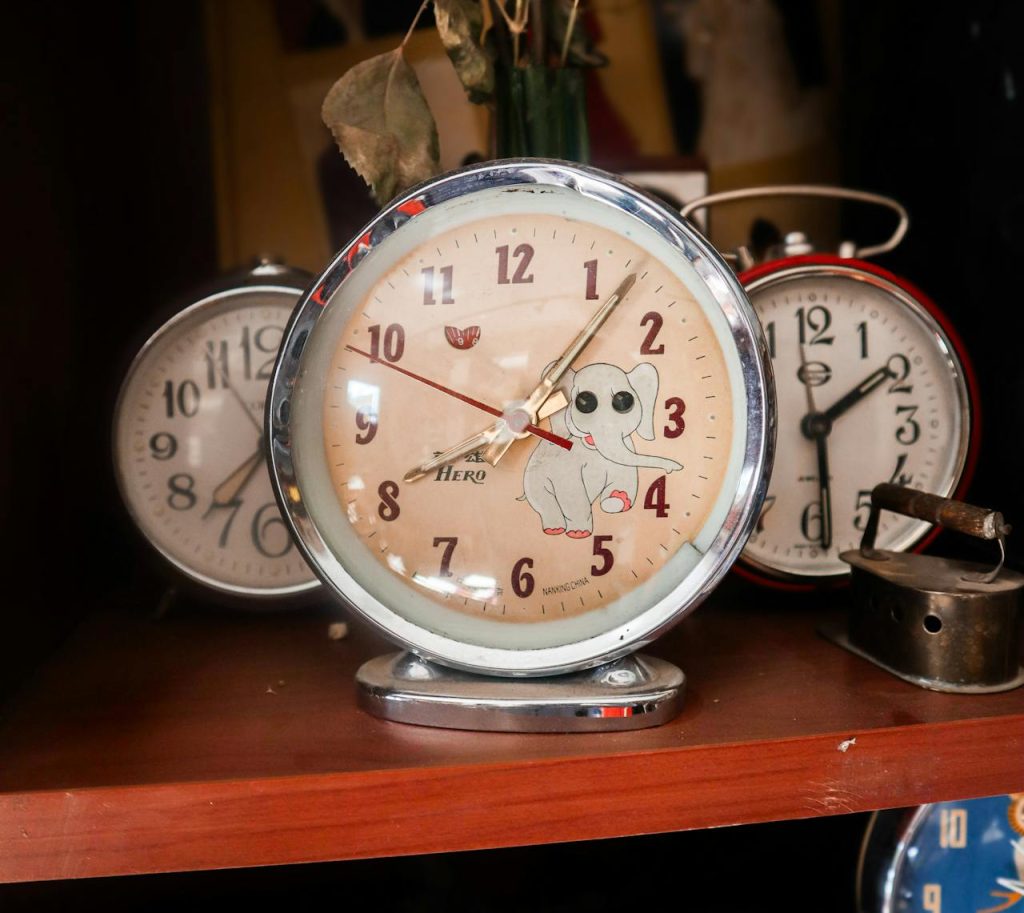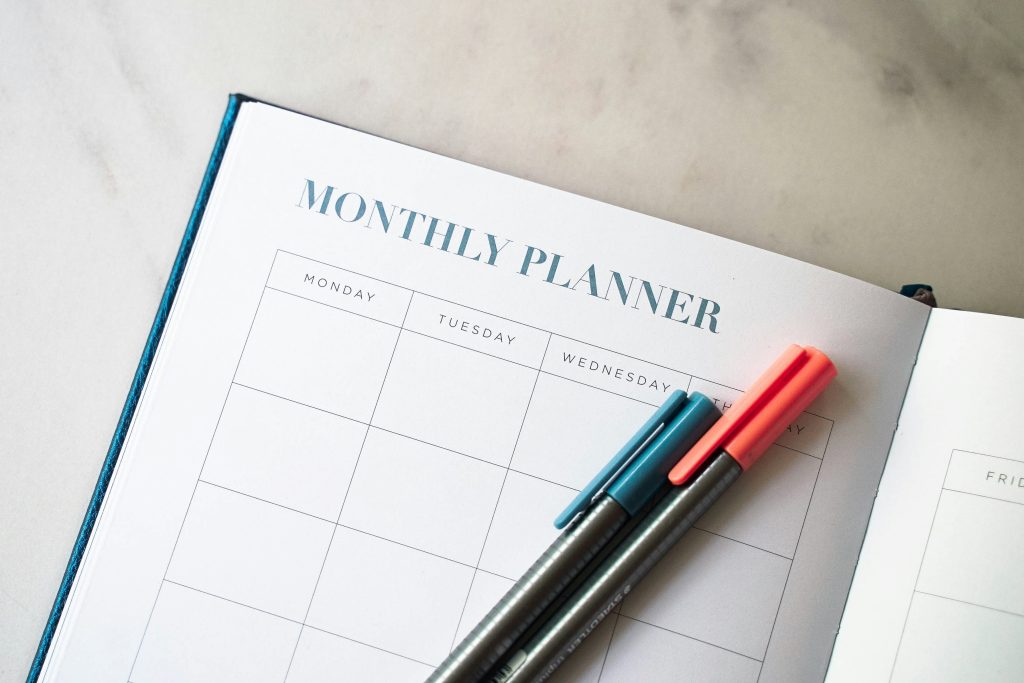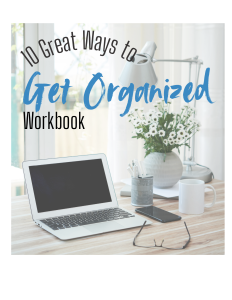
Smooth Out Your Life
“Happiness is not a matter of intensity but of balance, order, rhythm and harmony.” – Orison Swett Marden
Becoming organized is a great way to take control of your life. Read on to organize your life in 10 great ways.
If your home or workspace is cluttered and chaotic, you’re more likely to feel overwhelmed and stuck.
It’s hard to decide what to do next when so many things in your home or office are not organized well. As a result, you may find it difficult to prioritize tasks and achieve your goals.
There is some good news, though. Once your space is clear and well organized, your life will run more smoothly and you will want to organize all aspects of your life.
It’s easier to focus, be creative, and finish projects when you are organized. In short, being organized will set you up for long-term success.
Here are 10 Great Ways to {Finally!} Organize Your Life.
Table of Contents

#1 Focus on One Project at a Time
Multi-tasking might seem productive, but in reality, it splits your focus and slows you down. Instead of bouncing between tasks, focus on one project at a time. You’ll complete it faster, produce better results, and feel less overwhelmed in the process. The key to staying organized is giving your full attention to what matters most in the moment.
If you’re not sure where to start, brainstorm a list of all the areas of your life that need attention. Here are some areas to think about: The rooms in your home, your household papers, your daily and weekly schedule, your finances, your job details, your mind.
Pick just one area to focus on first. This could be a relatively small task, such as organizing your kitchen junk drawer, to give yourself a “quick win.”
Or you could choose a larger project, like organizing your daily and weekly schedules, that will have a more immediate and noticeable impact.

#2 Declutter and Organize Your Home
Here we talk about decluttering your home room by room. Get rid of anything you no longer need, use, or love. For example, when you declutter your closet, remove and get rid of any items that no longer fit, need repaired, or you haven’t worn in a while. Follow my decluttering plan to give structure to this project.
Declutter and organize at the same time. Don’t just try to organize all your stuff, much of which you do not need anymore. This approach will keep things in place so you don’t have to declutter ever again.
As you declutter, find a logical place for everything. The goal isn’t to just keep items out of sight in closets or drawers. Instead, focus on creating storage systems that make sense and help you. For example, keep cleaning supplies together in a portable carryall for easy access; keep hats and caps in a basket or box in your front closet. A place for everything means less time spent searching for what you need and more time enjoying a tidy, functional space.
Organizing might seem like a chore at first, but you will see how storing your remaining belongings efficiently can make sense; you will never again have to dig through stuff to find that misplaced item.
Becoming organized should not cost you much money. You may need to purchase a few inexpensive supplies in order to organize effectively. Investing in storage containers and shelving can be an improvement that will keep you organized for a long time.
You want a home that you love! It is not only de-cluttered but it works. It’s easy to live in, and it loves you back!
Here are some extra tips to help you declutter and stay decluttered:
• Remember the maxim, “A place for everything and everything in its place”.
• Put items away as soon as you are finished using them.
• Ask family members to give a hand when you are decluttering.
• Invite a friend to review your decluttering and give you suggestions.
• Designate an empty cupboard or other place where you can hide clutter in a hurry when necessary.
• Take breaks. Decluttering is not a race so be easy on yourself.
• If you have a number of family members, consider color-coding items for each person, from towels to scarves to paperwork folders and calendar notes
• When your decluttering project is finished always have a bag or a box designated for things you will donate in the future so that stuff doesn’t pile up.
• Experiment with ordering clothes and other items and have them delivered to cut down on shopping trips.
• Sort out your handbag often. Don’t let stuff build up in your purse or wallet. It will get heavy and you will have trouble finding things. Always keep it simple!

#3 Organize Papers and Computer Files
Create a folder system and file every piece of paper:
• Bills
• Statements
• Credit card offers you want to save
• Greeting cards to send
• Papers from your organizations
• Coupons
• Ads you want to follow up on
• Business cards
• Recipes
• School memos
• Kids’ artwork
Backup Important Computer Files
Chances are you have a lot of important files stored on your computer, including family photos, personal finance records, favorite recipes, and other significant documents. Continue to digitize certain documents. Also, keep these files organized with a naming system so that you can easily find any item.
Protect your files by backing them up regularly. Use cloud storage services and/or external hard drives to ensure nothing gets lost. A daily or weekly backup routine is essential, especially if your work or personal life relies on digital files.
Take Action: Take 10-15 minutes right now to review your file backup system. If you don’t have one, do research on backup services to get started.
Wise Words
"For everything there is a season, and a time for every matter under heaven."
Ecclesiastes 3:1 Tweet
#4 Goals and Priorities
Create a List of Current Goals
You are much more likely to achieve your goals if you write them down. So, take some time to outline what you want to achieve, why it matters to you, and how you’ll get there.
For greater success, use the VICTORY framework for goal setting. Read about VICTORY goals and all about goal setting in these articles:
Goals and Dreams: Discover the Life-Changing Benefits
How to Set Goals in 5 Steps: Explore Your Hidden Dreams
Meeting Goals: A Powerful 5-Step Strategy
Break each goal into smaller, manageable steps with deadlines. Add these steps to your planner so you can tackle them one at a time.
Don’t forget to have some fun with this process by rewarding yourself when you reach certain milestones on your goal journey.

#5 Organize Your Work Life
At work, whether at home or in a workplace, create a task priority list. List on a document or spreadsheet all of the work tasks to be done. Then label them by importance with a letter.
A. most urgent
B. next urgent
C. important but not imperative
Now sort your tasks, and you will have an organized mindset. You can detail this list to your liking. You might add steps for each project and number them.
When you are really busy with a project and need to concentrate, let people know that you cannot be disturbed except for emergencies, and let them know how to reach you, for example email or text. Let your phone go to voicemail.
When a colleague asks you to do something, don’t necessarily agree to it immediately. Tell the person, in a positive way, that you will think it over and get back to them. This is also a good habit for all areas of life. If you commit yourself too quickly, your schedule will get out of hand and you will feel overwhelmed and victimized.
While working, whether at home or in an office, take breaks now and then. Stretch your muscles, take a brief walk in the fresh air, or meditate for a few minutes. You will clear your mind and get a new perspective.

#6. Take Control of Your Time
Use a Calendar or Planner
A reliable calendar or planner is key to staying organized and on top of your priorities. Whether you prefer a digital solution, such as Google Calendar or Evernote, or an old-school pen and paper option, choose something simple and easy to use that works for you. Sort your daily tasks by time of day, and don’t get too ambitious and overload your schedule.
Set up a Family Calendar if appropriate. Include the family members in deciding who does what and when. Include chores, appointments, school and religious functions, sports activities, club meetings. Add a time of day for each event. This way everyone can know where family members will be and when. And everyone will know what they are responsible for with a quick check of the calendar.
As in tip #5 look at your goals and your planner each day and identify two to three tasks that you want to accomplish above all else. These are the tasks that you’ll focus on and tackle first. Add the time of day for each task and approximately how long the task should take. In some cases you could use a timer to help you stay on track.
Dedicate 15 Minutes Every Day
Spending just 15 minutes each day tidying up can make a big difference. Make it a habit by blocking out time at the end of each day to straighten your home or clear your workspace.
This one daily habit will keep clutter from piling up and ensure you wake up to a clean, organized environment. This quick daily cleanup routine will help you start off each day on the right foot.
Organizing your day and managing your time is sure to increase your productivity and peace of mind.

#7. Plan Ahead
Planning ahead can give you a good dose of calm and peace. Just planning the ordinary events of life can keep the chaos at bay. For example, plan your wardrobe for the week, taking into account the weather and your schedule.
I have done this for years and the habit has saved me from so much morning stress. I used to decide what to wear in the morning and then would have to inspect the clothes and press them if necessary. Then I would rifle through my jewelry box for the right accessory. The day started with adrenalin up to my eyeballs – and for no reason. I should have done this all the night before. Well, at least I finally changed my ways!
You can apply the same principal to your meals, your daily work projects, even your family dates and outings. Plan for a week or even a month in advance. Don’t leave your decisions to the last moment because you may end up with doing the wrong tasks, no family outings, and too many dinners of frozen pizza.
#8. Stockpile
The stockpiling habit is kind of fun and you will thank yourself for adding this activity to your life. There are a number of things you can stockpile so that you don’t have to shop at an inconvenient last minute.
Here is a short list:
• Greeting cards
• Postage stamps
• Wrapping paper and ribbon
• Gifts
• Small toys
• Paper towel, bath tissue, facial tissue, self-care products
• Any other item you tend to run out of often
#9. Lists, Routines and Systems
Creating the right system will keep you focused, organized, and prepared for what lies ahead.
Systems simplify your life by creating easy-to-replicate routines for tasks you do over and over again.
For example, here’s a simple system for handling mail:
1. Open and respond to items that are timely and important
2. Designate a single place for items you need to address later
3. File what you need to keep
4. Shred those items you don’t want but have sensitive information
5. Discard or recycle junk mail that you don’t need
Organize your mornings with a Spiritual Morning Routine, and also prepare for your day the night before. Get certain tasks done ahead of time like wardrobe selections and briefcase and handbag organization.
Other systems you could create include errand bundling, weekly cleaning schedules, and pet care.
If you are really strapped for time and have some room in your budget, consider hiring someone to take over certain routines. Having an organized routine will help them know exactly what to do. Be creative in finding a mother’s helper or errand runner.
Consider keeping handy lists to keep your mind from spinning. Here are some lists you may want to utilize:
• Shopping list
• Packing list for travel
• Things to do before leaving the house
• Evening routine
• Morning Routine
• House cleaning system
• Pet care routine

#10. Finances
Finances are one of the most common areas where people feel disorganized. The first step? Create a budget.
Use Financial/Accounting Software Find a financial tool or app that works for you.
Choose something you can access on both your computer and phone, if you need to use it on the go. Look for one that helps you budget, track spending, pay off debt, and plan for taxes. Knowing exactly where your money stands at a glance will reduce stress and help you stay on track.
Wrapping it Up – and Free Workbook
By taking these steps, you’ll create spaces and systems that reduce stress and boost productivity so you can focus on what truly matters. Getting organized doesn’t have to be complicated or overwhelming. All you need to do is start small, stay consistent, and enjoy the benefits of an organized life.
I have created a workbook to help you get your life organized step by step. Just fill in the the spaces as you would with any workbook.
Click on the image below to access the pdf, ready for you to read or print.


